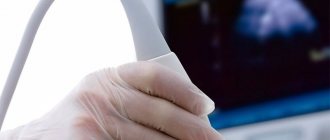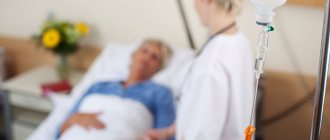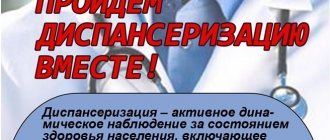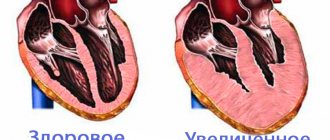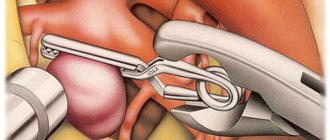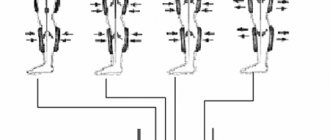Definition
Hiccups are periodically occurring involuntary myoclonic contractions of the diaphragm with possible involvement of the intercostal muscles (usually unilateral). The contraction results in a sudden inhalation followed by closure of the glottis, which is accompanied by a characteristic sound.
Duration
Short-term – up to 48 hours; long-term – from 48 hours to 1 month; intractable – more than 1 month.
Prevalence
Prolonged, difficult-to-control hiccups are quite common in patients with advanced cancer.
Anatomy and pathophysiology
The physiological mechanism of hiccups remains unclear. The hiccup reflex arc includes:
- afferent pathways: phrenic and vagus nerve pathways, sympathetic nervous system;
- diffuse “hiccup center”: midbrain, brain stem, proximal cervical spinal cord (C3 – C5);
- central neurotransmitters: dopaminergic and gamma-aminobutyric acid (GABA);
- efferent pathways: diaphragmatic, vagus and intercostal nerve pathways, conducting signals that cause contraction of the diaphragm.
Classification
Mild, short-lived hiccups
A common phenomenon, it can occur in anyone and usually goes away on its own. The causes of such hiccups can be: stomach irritation (overeating, aerophagia, that is, swallowing air into the stomach), consumption of carbonated drinks, spicy foods, alcohol, rapid distension of the stomach, as well as psychological factors, sudden temperature changes, smoking, etc.
Prolonged hiccups
May be caused by various reasons:
Peripheral
- gastrointestinal: gastroesophageal reflux (GERD), hiatal hernia, gastritis/peptic ulcer, gastric paresis, intestinal obstruction, cholecystitis, irritation of the diaphragm, gastric distension, pancreatitis, tumor;
- non-gastrointestinal: myocardial infarction, pericarditis, aortic aneurysm, enlarged thyroid gland, asthma, bronchitis, pneumonia, tuberculosis, otitis media (irritation of the eardrum).
Central
- neurological: cerebrovascular disorders (stroke), traumatic brain injury, intracranial tumor, multiple sclerosis, epilepsy, Parkinson's disease;
- psychogenic: anxiety, excitement, stress, fear.
Metabolic
- disturbance of electrolyte metabolism caused by excessive fluid intake: hyponatremia, hypokalemia, hypocalcemia;
- hyperglycemia, uremia, hypocapnia, hypoadrenalism (adrenal insufficiency) and other biochemical imbalances; Intoxication: infections, alcohol, oncology, etc.
Medicinal : opioids, benzodiazepines, glucocorticosteroids, dopamine agonists, cytochemotherapeutic agents, antibiotics, etc.
Others : surgical interventions, hepatomegaly.
Intractable hiccups
Of all the above reasons, intractable hiccups are most often caused by:
- pronounced distension of the stomach;
- liver enlargement;
- mass formation or acute cerebrovascular accident;
- irritation of the vagus and pharyngeal nerves (space-occupying formations in the neck, lungs, mediastinum, compressive nerves; esophagitis, esophageal obstruction, chest surgery);
- metabolic disorders;
- medications (eg opioids).
Anamnesis:
- the severity and duration of each episode of hiccups (severity does not always indicate a serious organic cause; in some cases, mild hiccups may be difficult to control);
- the relationship between hiccups and sleep (if hiccups disappear during sleep, a psychogenic factor is a possible cause);
- associated signs and symptoms;
- previous injury, surgery or acute illness;
- medication history;
- characteristics of previous episodes of hiccups, measures taken to relieve them and their results.
Physical examination to identify possible causes of hiccups:
- general appearance: signs of intoxication;
- head: tension of the temporal artery;
- ears: foreign object irritating the eardrum;
- throat: pharyngitis;
- neck: enlarged thyroid gland, cyst, enlarged lymph nodes, neck stiffness, tumor;
- chest: signs of pneumonia, pericarditis;
- abdomen: bloating, bowel sounds, tension, enlarged liver;
- nervous system: signs of acute cerebrovascular accident; delirium due to toxic/metabolic causes.
Don't miss the first signs of a stroke
Hundreds of thousands of cases of stroke are recorded annually in civilized countries. Unfortunately, if you “skip” the first minutes and hours of this terrible disease, the process becomes irreversible... That is why it is so important to know the rules of first aid for a stroke
When does a stroke occur?
A stroke occurs when the lumen is blocked or the wall of a vessel located in the brain is ruptured. A stroke can be ischemic (when a blood clot completely blocks the lumen of a blood vessel) and hemorrhagic (when the wall of an artery that supplies blood to one or another part of the brain ruptures, a hematoma is formed). In this case, naturally, the normal blood supply is disrupted and the death of brain cells begins. The process of damage to brain structures can develop extremely rapidly, and the longer a person does not receive proper medical care, the more irreversible changes occur.
What causes a stroke
There is no single cause of stroke, so it is customary to talk about a set of risk factors that can lead to stroke. First of all, this is, of course, heredity. If a person has “weak” vessels (that is, there is a genetically determined weakness of the connective tissue), he may develop an aneurysm (an expansion or dissection of the wall of the vessel supplying the brain), which, having reached a certain size, can “rupture” and a hemorrhagic stroke will occur. If a person has a tendency to accumulate “bad” cholesterol, then atherosclerotic plaques will form in his vessels, narrowing the lumen and promoting the formation of blood clots. Risk factors such as smoking, hypertension, arrhythmia, excess weight and diabetes mellitus also work. Therefore, no one can feel insured against a stroke.
Learn the rules of stroke
“Why do I need them,” you say, “I’m a completely healthy person, and my circle of relatives and friends includes young people full of vitality.” Unfortunately, stroke is rarely interested in the age of the person it comes to. Of course, men over 45 years of age and women over 55 years of age are at risk, but today there are frequent cases of stroke in both 30-year-olds and those who have just turned 25. Moreover, the younger the person, the less expected his symptoms may be , characteristic of a stroke, and therefore the longer he will remain without help, and the more tragic the consequences of a brain catastrophe may be.
Treatment
Non-drug
It is recommended for use before the use of medications; it is prescribed purely individually. The most common types of non-drug therapy are the following.
Changing the diet : reduce the single volume of food taken with an increase in the frequency of intake.
Use of mint infusion : helps relax the sphincters, should be freshly prepared, not used together with prokinetics that increase the tone of the muscles of the stomach and intestines and the lower esophageal sphincter.
Nasopharyngeal stimulation techniques:
- rinse your nose with cold water;
- suck cold water through a straw, swallow or suck small pieces of ice;
- swallow 1 teaspoon of dry granulated sugar;
- quickly drink two glasses of water;
- gargle with water;
- suck on lemon slices;
- swallow pieces of dry bread;
- inhale saline solution through a nebulizer;
- stretch your neck;
- massage the soft palate for 1 minute;
- stretch out your tongue with your fingers;
- press hard on your tongue.
Preventing irritation of the diaphragm : bend forward, pressing your knees to your stomach.
Stimulation of the C5 dermatome (interrupts stimulation of the hiccup neural arch):
- patting or scratching the back of the neck;
- placing a cold, safe metal object behind the collar (for example, a key);
- cold compress on the face.
Breathing manipulations:
- holding your breath;
- causing sneezing or coughing;
- frequent deep breathing (hyperventilation);
- breathing into a paper bag (hypoventilation);
- “Valsalva maneuver” (forced exhalation with the nose and mouth closed). Should not be carried out if you have a cold, because... the infection can penetrate into the middle ear cavity, and in patients with heart disease (increases blood pressure). Use caution in patients with pulmonary emphysema, primary/secondary tumor lesions of the lungs, so as not to provoke pulmonary hemorrhage.
Medication
Treatment for hiccups is determined by the cause of its occurrence. In palliative care, hiccups are most often caused by several causes; as a rule, an integrated symptomatic approach is used for treatment (see Diagram 1, Appendix 1).
Table 1 shows the medications and dosages used in the treatment of hiccups. The route of administration of drugs is oral (inside), unless otherwise indicated.
Diagnostics
There are many reasons for the occurrence of this symptom, so you first need to conduct a thorough diagnosis of the patient, find out where the lesion is located or whether it is a physiological process.
An important role in finding the cause of hiccups is played by the medical history, objective examination data, as well as laboratory and instrumental examination methods. The patient needs to be told how long he has been bothered by the existing symptoms, possible features of their occurrence, whether he consulted a doctor or whether breathing was restored on his own.
Additionally, the doctor will prescribe:
- general and biochemical blood test,
- if necessary, ECG, X-ray or CT scan of the chest,
- FGDS, MRI of the brain,
- lumbar puncture if a neuroinfection is suspected.
These studies will be enough to identify the lesion and establish the cause of hiccups.
Therapy methods
If the hiccups are episodic, go away on their own, and the patient has no other accompanying symptoms, then in this case no medical intervention is performed.
You can use a number of physiological methods to get rid of hiccups. All of them are aimed at breaking the pathological reflex arc. Such activities often help - breathe into the bag, hold your breath, lightly press on the eyeballs, bring your legs to your stomach, lightly press on your chest. The symptoms go away within a couple of minutes if you hold a piece of ice or lemon in your mouth.
In another situation, depending on the cause, the doctor prescribes appropriate treatment. Muscle relaxants, antidepressants, antiarrhythmics, and other drugs aimed at the etiological treatment of the disease can be used as drug therapy.
In cases of significant hiatal hernias with complications or tumor damage to the brain or digestive tract, surgical intervention may be required.
Prevention and prognosis
You can prevent the occurrence of physiological hiccups by observing the following rules.
It is necessary to eat breakfast, lunch or dinner slowly, chewing thoroughly, which will prevent excessive swallowing of air. You should also not eat dry, too cold or hot food. It is necessary to undergo regular examination by a doctor so as not to miss any disease. Avoid hypothermia or dehydration. Follow the principles of a balanced diet.
In terms of ability to work and life, the prognosis is favorable. Hiccups are not a threatening condition, unless we consider the intractable form. However, it can disrupt sleep and daily activities, cause dehydration, chronic fatigue, lead to weight loss, and starvation.
Prolonged hiccups may be a sign of dangerous diseases
Therapist, family doctor Tatyana Romanenko told Zvezda in which cases hiccups can become a sign of dangerous diseases.
The expert explained that hiccups occur as a result of spasms of the diaphragm, which leads to rapid closure of the glottis. This creates obstacles to the flow of air, resulting in a characteristic sound. Hiccups are aimed at displacing air from the stomach.
“We must understand that in general hiccups, if they do not exceed 10-15 minutes, we call them short-term or episodic. If hiccups continue for up to 2 days, then they are already called persistent, and they require differential diagnosis. Long-term, persistent hiccups may occur that persist in the patient for up to 2 months or more. Such hiccups are a reason to consult a doctor,” Romanenko emphasized.
The doctor drew attention to the fact that prolonged intractable hiccups can occur during a stroke.
“If a person develops hiccups for no apparent reason, and this is accompanied by an increase in blood pressure or, say, a disturbance in speech, swallowing, and so on, first of all we must rule out brain pathology and the development of a stroke,” the doctor warned.
Hiccups can also occur due to tumor processes in the brain. This situation requires contacting a doctor and taking immediate action. Sudden, intractable hiccups are a reason to suspect brain disease.
“A tumor, stroke, aneurysm of the cerebellar artery - everything can be the cause of prolonged hiccups,” Romanenko noted.
Sometimes hiccups can also occur with diseases of the cardiovascular system, diseases of the pharynx, bronchi and lungs. There may also be toxic hiccups - hiccups that occur as a result of some kind of toxic lesion. Medicines can also trigger hiccups, particularly those used in psychiatry.
Long-term hiccups are a reason to see a doctor, but short-term hiccups, in turn, can go away on their own. But to speed up this process, you can use common everyday methods.
“Most often, if it is a short-term hiccup, it will go away on its own. Sometimes we recommend this breath-hold test. What's the point? We increase the concentration of carbon dioxide, reduce the excitability of the diaphragm, and as a result, the hiccups stop. We suggest doing several breathing movements with holding your breath. Sometimes we even use a paper bag for this purpose. A plastic bag should not be used - it is dangerous because it may stick to the nostrils. This can provoke many unpleasant consequences,” the doctor advised.
The expert also recommended that in case of occasional hiccups, drink water in small sips, suck on a piece of bread, sugar or ice. All this sometimes helps to stop an attack of hiccups.
